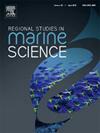Estimation of plastic waste inputs from the Kura-Aras Basin into the Caspian Sea
IF 2.1
4区 环境科学与生态学
Q3 ECOLOGY
引用次数: 0
Abstract
Rivers could play a crucial role in moving plastic debris of all sizes and contributing to the growing environmental problem of marine plastic pollution. Most recent studies that have estimated the global contribution of plastic from rivers to the oceans or seas focus on coastal areas or major polluting rivers and ignore smaller rivers and individual basins. The present study investigated the solid waste generation rate, management, and final disposal methods in the Kura-Aras basin (KAB). It estimated the amount of plastic waste entering the Caspian Sea through this basin. The results showed that the condition of solid waste management in the KAB countries is unsatisfactory, and ∼91 % of the plastic waste generation in the KAB is mismanaged plastic waste (MPW), weighing 381,653 tons year−1. The KAB carried 12,439 tons of MPW into the Caspian Sea each year, with the lowest amount being 3909 tons and the highest being 23,038 tons (by sensitivity analysis, ± 50 % of the base value). This amount equals 1–6 % of the annual mismanaged plastic waste in the KAB. According to our research, river basins must implement efficient strategies for managing and reducing plastic pollution.
求助全文
约1分钟内获得全文
求助全文
来源期刊

Regional Studies in Marine Science
Agricultural and Biological Sciences-Ecology, Evolution, Behavior and Systematics
CiteScore
3.90
自引率
4.80%
发文量
336
审稿时长
69 days
期刊介绍:
REGIONAL STUDIES IN MARINE SCIENCE will publish scientifically sound papers on regional aspects of maritime and marine resources in estuaries, coastal zones, continental shelf, the seas and oceans.
 求助内容:
求助内容: 应助结果提醒方式:
应助结果提醒方式:


